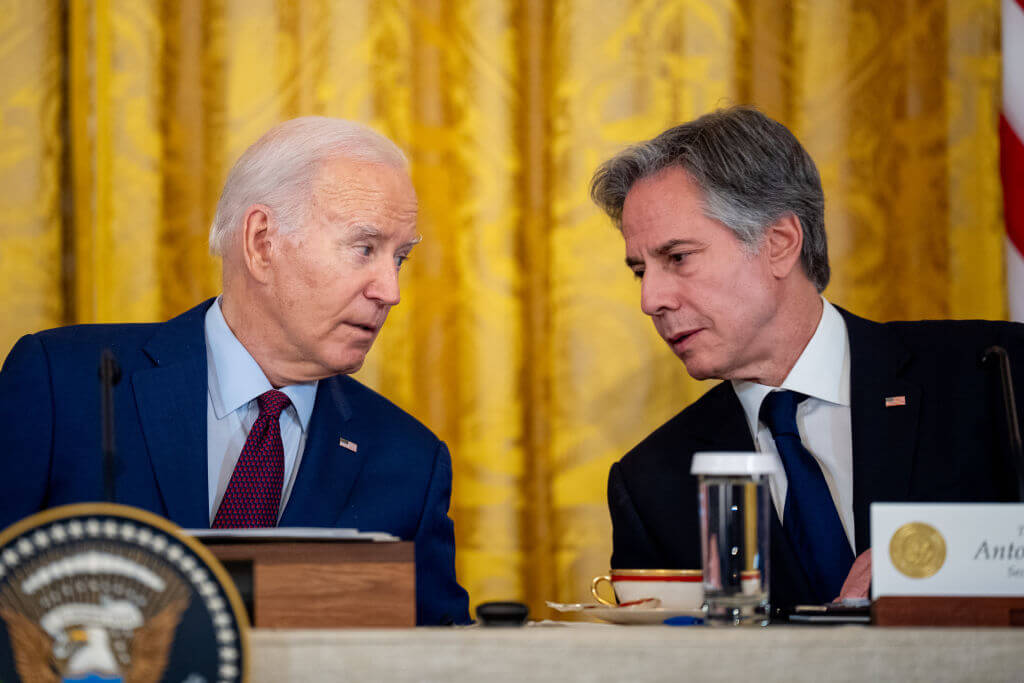Palestinian Minister Dies After Confrontation With Israeli Troops

Face Off: Palestinian minister Ziad Abu Ein scuffles with Israeli troops during a protest on the West Bank. He later died. Image by getty images
A Palestinian minister died on Wednesday shortly after an Israeli border policeman shoved and grabbed him by the throat during a protest in the West Bank, an incident Palestinian President Mahmoud Abbas described as barbaric.
Ziad Abu Ein, 55, a minister without portfolio, was among scores of Palestinian and foreign activists who were confronted at an Israeli checkpoint while heading to a demonstration against Jewish settlements in the occupied territory.
Around 30 Israeli soldiers and border policemen fired tear gas and sound grenades at the group and a scuffle ensued in which a border policeman pushed Abu Ein and grabbed his neck firmly with one hand. Footage of the incident and pictures taken by Reuters do not show Abu Ein responding with any violence.
Minutes later the minister began to look faint and fell to the ground clasping his chest. He died on his way to hospital.
It was not clear what caused his death. An autopsy is being carried out with Palestinian, Israeli and Jordanian pathologists present, with the results expected later on Wednesday.
The incident comes at a time of heightened tension between Israel and the Palestinians, following months of violent unrest in Jerusalem, Tel Aviv and the Israeli-occupied West Bank.
Hoping to head off any escalation as well as a possible erosion of security cooperation with Abbas’s forces, Israel reinforced troops in the West Bank. It also issued an apology.
“We are sorry about his (Abu Ein’s) death,” Defense Minister Moshe Yaalon said in a statement. He said Israel was investigating the incident as well as taking part in the autopsy. “Security stability is important for both sides and we will continue coordinating with the Palestinian Authority.”
PROTESTS
Clashes broke out in a refugee camp near Ramallah and an Israeli soldier shot and critically wounded a Palestinian youth, Palestinian medics said. Ramallah shops were shuttered for the day in protest at the minister’s death.
Israel’s army spokesman said the march towards the settlement involved “approximately 200 rioters” and was stopped by its forces using “riot dispersal means.” Footage shows the marchers moving peacefully towards the demonstration, although at one point an Arab man struck an Israeli soldier with a flag.
Abbas described the incident as “a barbaric act which we cannot be silent about or accept.” He announced three days of national mourning and said “necessary steps” would be taken after an investigation, but did not elaborate on whether security ties with the Jewish state would be affected.
Abu Ein, who was convicted of killing two young Israelis in a bomb attack in 1979 and released as part of a prisoner swap in 1985, was a vocal opponent of Israel’s settlement expansion in the West Bank, which Palestinians want as part of an independent state together with Gaza and East Jerusalem.
A leader of Palestinian civil society groups for decades, Abu Ein was a regular attendee of non-violent protests and was appointed this year to head a government-backed protest group, the Committee to Resist Settlements and the Wall.
Shortly before his death, Abu Ein spoke to television reporters, sounding hoarse and short of breath.
“This is the terrorism of the occupation, this is a terrorist army, practicing its terrorism on the Palestinian people,” he told the official Palestine TV. “We came to plant trees on Palestinian land, and they launch into an attack on us from the first moment. Nobody threw a single stone.”
Ten Israelis and a foreign visitor have been killed by Palestinian assailants over the past three months, while more than a dozen Palestinians have also been killed, including most of those who carried out the attacks.

I hope you appreciated this article. Before you go, I’d like to ask you to please support the Forward’s award-winning journalism this Passover.
In this age of misinformation, our work is needed like never before. We report on the news that matters most to American Jews, driven by truth, not ideology.
At a time when newsrooms are closing or cutting back, the Forward has removed its paywall. That means for the first time in our 126-year history, Forward journalism is free to everyone, everywhere. With an ongoing war, rising antisemitism, and a flood of disinformation that may affect the upcoming election, we believe that free and open access to Jewish journalism is imperative.
Readers like you make it all possible. Right now, we’re in the middle of our Passover Pledge Drive and we need 500 people to step up and make a gift to sustain our trustworthy, independent journalism.
Make a gift of any size and become a Forward member today. You’ll support our mission to tell the American Jewish story fully and fairly.
— Rachel Fishman Feddersen, Publisher and CEO
Join our mission to tell the Jewish story fully and fairly.
Our Goal: 500 gifts during our Passover Pledge Drive!
























